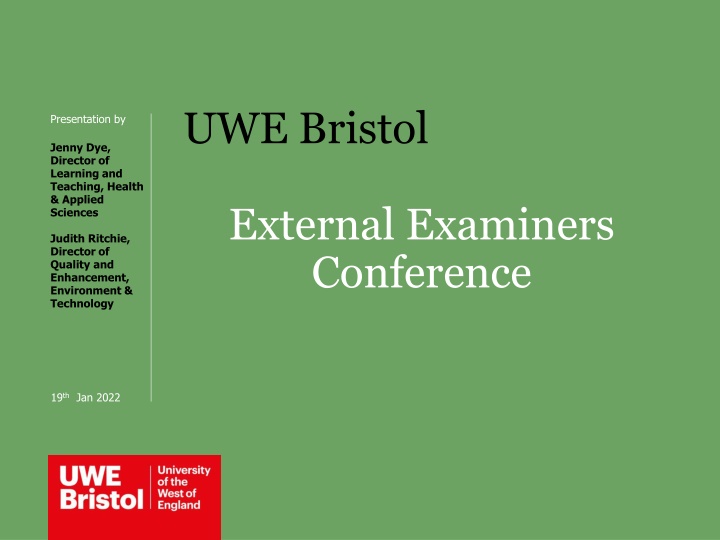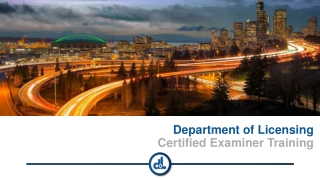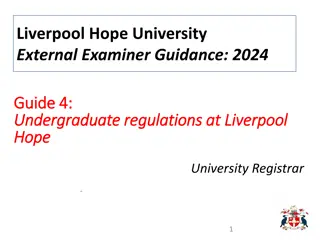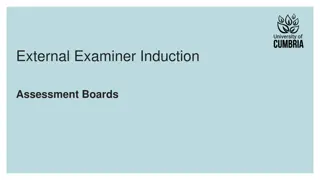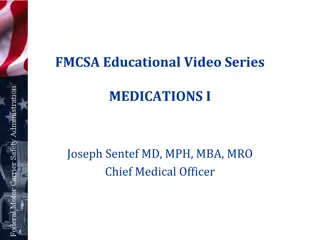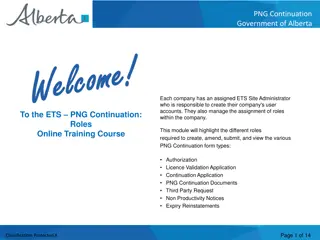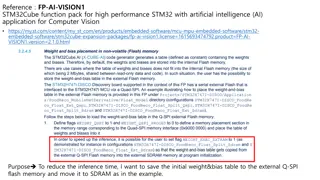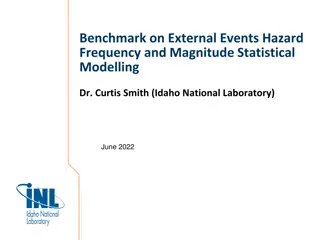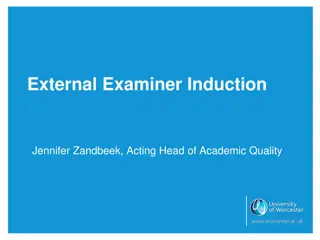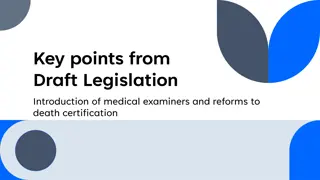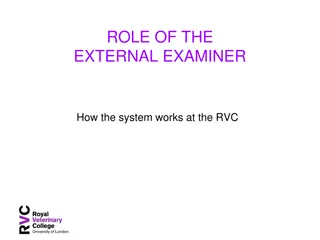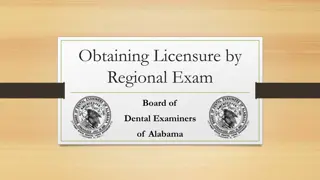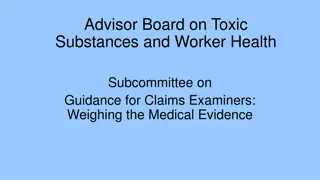Roles & Responsibilities of External Examiners in Higher Education
The roles and responsibilities of Chief and Field External Examiners in higher education institutions, including duties, decision-making processes, reporting requirements, and restrictions. Emphasizes the importance of upholding academic standards, conducting assessments, and ensuring quality assurance.
Download Presentation

Please find below an Image/Link to download the presentation.
The content on the website is provided AS IS for your information and personal use only. It may not be sold, licensed, or shared on other websites without obtaining consent from the author.If you encounter any issues during the download, it is possible that the publisher has removed the file from their server.
You are allowed to download the files provided on this website for personal or commercial use, subject to the condition that they are used lawfully. All files are the property of their respective owners.
The content on the website is provided AS IS for your information and personal use only. It may not be sold, licensed, or shared on other websites without obtaining consent from the author.
E N D
Presentation Transcript
UWE Bristol Presentation by Jenny Dye, Director of Learning and Teaching, Health & Applied Sciences External Examiners Conference Judith Ritchie, Director of Quality and Enhancement, Environment & Technology 19thJan 2022
External Examiners Chief EE appointed to a cognate group of programmes. Field EE appointed with responsibility for a module or specified group of modules within a named field. Field EE may also have responsibility for modules delivered at partner institutions in UK or overseas. External examiners will have an academic and/or practice background. All modules at FHEQ 5 and above require external examiner scrutiny. Overview only below FHEQ 5, unless PSRB requires otherwise. FHEQ v UWE levels
Roles and responsibilities of the Chief EE Award Board Attendance o Progression and achievement o Conduct of award board o Overall assessment process and parity of approach to assessment. Annual Reporting
Roles and Responsibilities of the Field External Examiner Ensure assessments are properly conducted Ensure standards/levels are appropriate; consider comparative performance across range of cohorts both at UWE and at partner institutions. Participate in Field Board decision-making e.g. consideration of any adverse cohort circumstances Report on the effectiveness of assessments Report on the conduct of the examining board Report any matters of serious concern arising from the assessments which put at risk the module standard
Field EEs are not permitted to; Attend Award Boards (unless a PSRB requirement) Be involved in Award Board decisions regarding student progression and achievement (unless a PSRB requirement/appointed as non-modular EE also) Change marks for individual students Name individuals in their annual reports
Quality Code (2018) Expectations for standards - external expertise : The academic standards of courses meet the requirements of the relevant national qualifications frameworks The value of qualifications awarded to students at the point of qualification and over time is in line with sector-recognised standards. Core practices related to the external examiner role The provider ensures that the threshold standards for its qualifications are consistent with the relevant national standards. [Maintainer of academic standards] The provider ensures that students who are awarded qualifications have the opportunity to achieve standards beyond the threshold level that are reasonably comparable with those achieved in other UK providers [Guardian of national standards] The provider uses assessment and classification processes that are reliable, fair and transparent [Process checker] From UKSCQA & QAA (2018) UK QC for HE, Advice & Guidance: External Expertise QAA. p3
Activities include: Reviewing assessment tasks /tools Sampling the marking of student work o Expected documentation Placement visits for professional practice modules Hearing the student voice Attending Examination Boards Acting as a critical friend to the module / programme team o External reviewer (additional contract) Writing an Annual Report for the University
Regulations Three types of modules; o Standard/project/professional practice 1. 3 day Grace period 2. Extensions (7 day) 3.Reasonable adjustments eg: 1. 14 day grace period 2. Alternative assessments 4.Adverse Group Circumstances 5.Assessment Offences 6.Other policies
Case Study You are EE for a module that is delivered at UWE and at an FE college (collaborative provision). During external moderation you note the following statistics; HE/FE Average Mark Pass Rate UWE 58.4% 88% FE 68.4% 100% What are your questions/considerations?
Options 1. All FE work must be re-marked 2. Work marked at below 50% must be re marked 3. Allow all marks to stand 4. Something else ..
Example of adverse group circumstances Exam paper consisting of 4 compulsory questions. Some key module content not delivered/poorly delivered. Concerns raised by students post exam.
Analysis; process and action 1.What is the evidence? 2.Does the evidence support the concern? i. E.g. Analysis of student performance current and comparable cohorts 3.What is the impact? 4.If a potential impact is agreed should any action be taken? 5.If yes, what actions are available?
Possible actions (needs board approval) Examples of actions available; o mark uplift - %age versus actual Impact of changing marks fail pass Rigour; have LO s, professional standards been met o No action o Resit uncapped o Null and void (new assessment) etc.
Assessment and Feedback Policy Quality processes related to assessment setting and marking will be found in the Assessment and Feedback Policy Separate Policy and Guidance Documents o Principles o Internal marking options o Moderation requirements Guidance on sample selected o Aggregate mark guidance o Links to annual monitoring
Assessment and Feedback Policy External moderation summary; EE sample moderation; 10% of cohort scripts; min 6 max 12. Where EE has oversight of collaborative provision they should also receive a sample as above, clearly identified as collaborative provision. EE provided with related documentation e.g. module handbook, evidence of moderation, assessment, marking criteria, module report prospective, retrospective. o External examiner blackboard tab.
